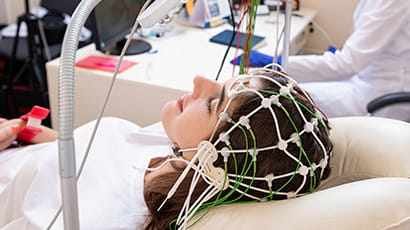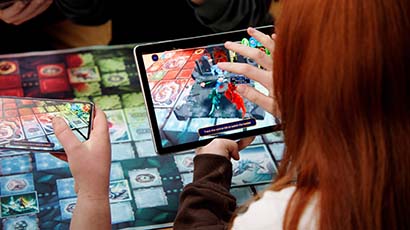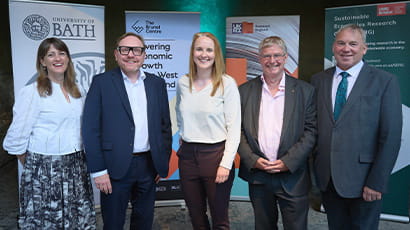Disruptive technology to predict faults on train tracks and in stations

Train delays could be a thing of the past, thanks to a system that predicts when part of a train track, signalling equipment or other devices at a station are likely to fail. It does this by using thousands of sensors and 3D modelling that taps into big data.
The system, currently in development, will also allow engineers to use Augmented Reality (AR) via a smartphone or a Head Mounted Display (HMD) to locate failing components or structure faults and read on-screen instructions in real-time to help them with repairs.
The project is a collaboration involving the University of the West of England (UWE Bristol), smart engineering solutions company Costain and engineering technology start-up Enable My Team (EMT), which is the project lead.
A network of Internet of Things (IoT) sensors will initially be installed in 2019 in London Bridge Station, which is to be used as a test site. The sensors will gather data on tracks and station facilities, such as ventilation systems, barriers or lighting before sending it to a software called i-RAMP (IoT-enabled Platform for Rail Assets Monitoring and Predictive Maintenance).
The system will then use Artificial Intelligence (AI) techniques to analyse the data and to predict when a fault is likely to occur and highlights any stress points or component failures on a 3D virtual model of the station and tracks.
It is set for completion in April 2020, after which it will be trialled with selected customers for up to nine months. Five other train stations in the UK have been approached to serve as testing sites for the technology. The roll-out of the scheme is planned for 2021.
Professor Lukumon Oyedele, Assistant Vice-Chancellor, Digital Innovation and Enterprise, who is the principal investigator on the project at UWE Bristol, said: “Every day in the UK, production is adversely affected by the hundreds of hours lost through train delays, often caused by faulty signal boxes or broken tracks.
The system will enable companies to fix a problem before it even becomes one, and at a time when commuting is not disrupted, all thanks to the IoT sensors in the station and on the track.”
IoT sensors can transmit a whole variety of data including vibration, strain or pressure on a structure, humidity or temperature. Using several such components will enable train companies and station managers to monitor many parts of a train network at the same time.
Sandeep Jain, who is Founder & CEO at Enable My Team (EMT), said: "i-RAMP could bring reliability to the 1.7 billion annual passenger journeys on the UK railway, increasing productivity across the country. With machine learning and big data processing we can predict problematic vegetation, damaged structures and faulty signals, allowing repairs to be implemented before issues arise."
The system will also allow engineers to use Augmented Reality (AR) technology that offers them information about the location of faulty components and provide guidance on how to fix it. As well as orienting them to the exact place where the problem lies, it will also supply them with real-time instructions and warn of dangers when carrying out the repairs
Professor Oyedele said: “By wearing a headset or using their mobile phones, engineers can view instructions superimposed on the joint or electrical circuit that they are repairing or replacing. For instance it might give information or warnings about the presence of high voltage in a section of a control panel, or how to disassemble an electric circuit in a signal box in a safe way.”
Related news

12 December 2025
UWE Bristol’s environmentally conscious and student-focused accommodation wins three awards
Purdown View, the world's largest certified Passivhaus student accommodation development, has been recognised at Property Week Student Accommodation Awards.

25 November 2025
Health-tech start up MyCelsius launches breakthrough cooling tech for hot flushes developed at UWE Bristol’s Launch Space
A pioneering Bristol-based health-tech company developing cutting-edge cooling technology for hot flushes has credited UWE Bristol’s Launch Space incubator with playing a key role in accelerating its product development.

14 November 2025
Lecturer wins prestigious Times Higher Education award for innovation in teaching
A senior paramedic science lecturer at UWE Bristol has been named the most innovative teacher of the year in the Times Higher Education Awards 2025.

13 November 2025
Alliance Medical and UWE Bristol launch UK’s first PET-CT postgraduate certificate
In a move set to transform imaging education, Alliance Medical (AML) and UWE Bristol have joined forces to co-design and develop the UK’s first PET-CT Postgraduate Certificate (PG Cert).

13 November 2025
New AI research to revolutionise animal welfare
A UWE Bristol research project will combine behavioural science and AI to create technology that understands not only what animals do, but how they feel.

29 October 2025
UWE Bristol academic unveils breakthrough in energy-efficient AI at NATO science forum
Dr Jonathan Lancelot has developed a new form of AI that could transform how intelligent machines operate in space, defence, and remote environments.

07 October 2025
Academic playing role in project to find hidden graves in Mexico using drone technology
A UWE Bristol lecturer is playing a part in a project using drone technology to locate concealed graves in Mexico.

01 October 2025
New funding for researchers to develop trustworthy clinical AI for assessing brain activity
Researchers have received funding from UK Research and Innovation to help bring their innovative brain-monitoring AI technology closer to real-world use.

11 September 2025
New study to investigate augmented reality as an intervention for emotionally based school avoidance
A UWE Bristol researcher will support a new study exploring whether an augmented reality board game can help young people with emotionally based school avoidance (EBSA).

22 August 2025
A decade of Future Space: How UWE Bristol’s enterprise zone is powering innovation and economic growth
Tracey John, Director of Research and External Engagement, reflects on the impact of Future Space and its role as a launchpad for cutting-edge companies shaping the future of how we live and work.

11 July 2025
Wound dressings developed with support from UWE Bristol to be launched by global firm
Technology that a team of UWE Bristol scientists helped develop to aid the healing of chronic wounds will be used in new ‘smart dressings’ being launched by global medical company.

03 July 2025
Research lab The Brunel Centre opens to power sustainable and inclusive growth for the West of England
A new data and research centre designed to support sustainable and inclusive growth and industrial strategy in the region, has officially launched.






